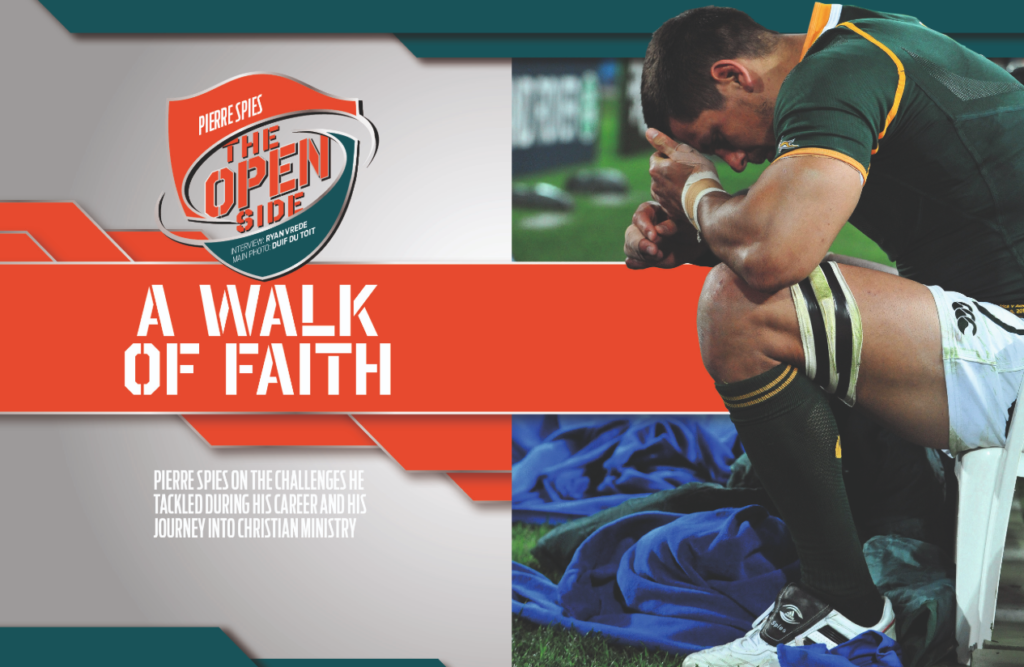Former Springbok and Bulls No 8 Pierre Spies chats to Ryan Vrede about the challenges he tackled during his career and his journey into Christian ministry.
Talk through the process of your retirement.
I was led by my heart. I’ve been a born-again Christian since I was 20 and I see everything we do as a journey with God. But it was hard. I’m not sure if people know the story but it all happened quite quickly at the beginning of 2017, when I still had two years to run on my Montpellier contract and was playing great rugby. I was praying one day and asked God that whatever he was doing in my life, that He would do it quicker. Then at the end of the season at the year-end function they [the club’s management] told six players that they were being let go and I was one of them. My wife was eight and a half months’ pregnant and we’d just moved into a new house. We were planning to live in France and get French citizenship.
But then that happened and I couldn’t see myself moving for rugby again. So I drove to a public park and prayed again. I didn’t think I’d be done with rugby, especially when I saw guys like Victor Matfield and Schalk Brits playing well into their 30s. I didn’t need the money, I’d invested well, so that wasn’t an issue. But I’d always thought that I’d be involved in ministry at some point in my life and after calling my pastors in South Africa and speaking to my wife, I felt at peace about retiring and going home. I’m very thankful about my career and what I got to experience. It’s been an amazing journey.
What has the transition into retirement been like?
It’s a massive change and challenge. To go from that routine – where everything is taken care of for you and you just focus on doing your job – to the real working world is a big change. As a player, your time is your own. Nobody tells you what to do and you determine your own schedule. When you’re working for somebody you have to give an account of your time. The biggest challenge is switching from a world where you are the elite at your job to one where you are a novice. It’s harder for those who don’t lead a balanced life during their career because if rugby is your everything, the change is even harder.
Those who stay in the game as coaches or members of the rugby media have fewer problems because they stay in that environment. But for the others it can be incredibly hard. I read Quiet Strength by Tony Dungy, an NFL Hall of Fame coach, in which he details shocking numbers of players who went bankrupt, got divorced, were depressed or had suicidal thoughts, all within two years of retirement. That can easily happen to a rugby player if he doesn’t have the requisite coping mechanisms and support structures.
What did being out of your comfort zone in Pretoria teach you?
You have to let go of your fears, your expectations of comfort and so on. One of the great things that sport develops is mental strength and you need every ounce of that when you’re in an unfamiliar environment trying to make a living to ensure your family are comfortable.
*This article originally appeared in the January issue of SA Rugby magazine, on sale now!
With 12 years of hindsight, how do you reflect on the withdrawal from the 2007 World Cup squad?
I would have loved to have been part of the whole journey, but it is what it is. I was young enough to hope that I could play in future World Cups, so that helped a bit but at the time it was hard to take. Even now, with this last World Cup, some of those feelings came up again. I caught myself wondering ‘what if’ but that’s a bad mindset. I’ll be forever grateful that I started walking with God as a young person and that has given me a hope of a great future and purpose for my life, whatever that entails.
The rumours about steroid use must been hard to stomach given that integrity has always been a defining factor for you.
It wasn’t nice at all and I still think about it. That’s the sad thing about the media and social media; everybody has the ability to say what they want without any restrictions and have this massive platform to spread their thoughts and opinions. I know the truth in my heart and but it’s the nature of man to criticise, even when they don’t know the person they’re criticising or all the details of the matter. There was no winning there, so I just kept my head down. The important thing was that I knew the truth.
What pressures are placed on players that lead some to look for an unfair advantage in that way?
I think it goes back to people’s character. Some will do it and not care about the moral implications, because all that matters to them is getting that edge. The pressure is there but at the very top level I don’t believe it makes you a more effective player because at that level there are a lot of talented, physically strong players. The difference between those who make it and those that don’t is mental strength. There are no steroids that can help you with that. The best and most effective Test players haven’t necessarily been the most talented. They’ve been able to put a match-defining performance together because of their mental strength.
Part of fame is access to a lifestyle that doesn’t sit well with Christian faith. How difficult was it to balance those two facets of life?
In any working environment there are people of different beliefs and values, which is fine. You need to learn to work within that without compromising your own beliefs. I’ve always maintained that if my marriage is strong and my life is open to scrutiny by men of faith I trust, then I’ll be just fine. It isn’t like I was antisocial at all. When the team were having beers after a match or at a function, I’d sit there and enjoy the camaraderie. But I knew when to call it a night and go to my room or go home. I’ve also never had issues with women, because from early in my career I set boundaries that meant I’ve never been in situations that could compromise me. Yes, I’ve seen guys struggle with fame and the access to different stuff that fame can give you but I’ve never judged them and, when I could, I’ve always tried to build a relationship that allows me to share some thoughts that could help them manage it better.
What is the one thing you had to ‘unlearn’ about how you were conditioned to think about faith?
I had to understand that Christianity is less about religion and more about your relationship with God. My grandfather and father were ministers. I grew up in a Christian home, but that didn’t make me a Christian. I had to make a decision for myself to follow God and then to be in relationship with Him. Part of that is having a high level of consistency between my public and private life. I can’t be one thing in public and another when I’m alone.
What does the future hold for you?
It really is the desire of my heart that God will use me to impact my generation. How and where in the world that happens is yet to be seen. I have goals that keep me focused but my family and I are open to whatever happens.
*This article originally appeared in the January issue of SA Rugby magazine, on sale now!





